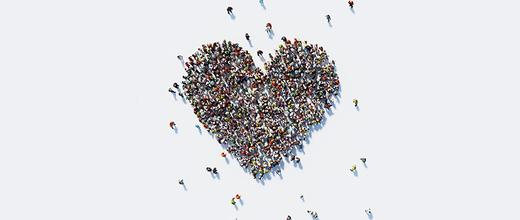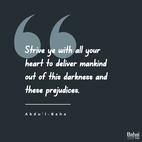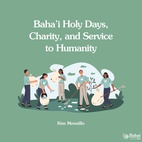The views expressed in our content reflect individual perspectives and do not represent the official views of the Baha'i Faith.
We all make plans. Each person, most organizations and every nation has some sort of plan for the future—but is there a plan for humanity as a whole?
If a Supreme Being exists, wouldn’t that Creator have a plan in mind for His creation?
The Baha’i teachings say that such a divine plan does exist, even though most of humanity may not yet be aware of it:
At a time when warfare and strife prevailed among nations, when enmity and hatred separated sects and denominations and human differences were very great, Baha’u’llah appeared upon the horizon of the East, proclaiming the oneness of God and the unity of the world of humanity. He promulgated the teaching that all mankind are the servants of one God; that all have come into being through the bestowal of the one Creator; that God is kind to all, nurtures, rears and protects all, provides for all and extends His love and mercy to all races and people. Inasmuch as God is loving, why should we be unjust and unkind? As God manifests loyalty and mercy, why should we show forth enmity and hatred? Surely the divine policy is more perfect than human plan and theory; for no matter how wise and sagacious man may become, he can never attain a policy that is superior to the policy of God. Therefore, we must emulate the attitude of God, love all people, be just and kind to every human creature. We must consider all as the leaves, branches and fruit of one tree, children of one household; for all are the progeny of Adam. We are waves of one sea, grass of the same meadow, stars in the same heaven; and we find shelter in the universal divine Protector. – Abdu’l-Baha, The Promulgation of Universal Peace, p. 174.
Many of you are probably familiar with the covenant God made with Abraham in the Bible, in which God promised not to leave humanity alone and unaided. Another sacred covenant was established when God revealed to Moses the Ten Commandments and the Israelites promised to obey them. Later, the “new covenant,” sealed by Christ’s crucifixion and death, promised God’s grace, mercy, and forgiveness of sins.
Each messenger of God makes another kind of covenant with his followers. It’s important to remember here that the messenger is the spokesperson for God, who “speaks not without His leave”—meaning he only says what God inspires and allows him to say. Therefore, Baha’is believe the principles, laws and ordinances revealed by these messengers, these “gems of divine holiness,” should be treated, along with their lives and examples, as the will of God Himself. Their teachings are meant to educate humanity and help it to progress. Each prophet reveals teachings applicable to the age and time in which they appear.
Once we recognize the messenger of God, he asks us to observe his laws and ordinances. This is a tall order, one which people have been trying to follow for thousands of years. Will we achieve it? Not without God’s help and assistance. That’s why we need to ascertain His plans, act on them, and change our behavior to more closely align with what is acceptable in His sight.
This is, no doubt, a tough road, but one filled with glory and satisfaction, not just for the individuals that walk it, but also for the entire human race, and for this planet we inhabit together—if we choose this path.
What, then, is God’s plan for this current age we live in? Interestingly, the Baha’i teachings say that God has a major plan and a minor plan:
Our fellow human beings everywhere are insensibly subjected… to… the continuous operation of simultaneous processes of “rise and of fall, of integration and of disintegration, of order and chaos.” These Shoghi Effendi identified as aspects of the Major Plan and Minor Plan of God, the two known ways in which His purpose for humankind is going forward. The Major Plan is associated with turbulence and calamity and proceeds with an apparent, random disorderliness, but is, in fact, inexorably driving humanity towards unity and maturity… – The Universal House of Justice, April 1998, to the Baha’is of the World.
Minor Plan of God: The part of God’s Plan that is revealed by Baha’u’llah to His followers and is laid out for them in detailed instructions and successive plans by Abdu’l-Baha, Shoghi Effendi, and the Universal House of Justice. In contrast to the Major Plan of God, it proceeds in a methodical, ordered way, disseminating His teachings and raising up the structure of a united world society. – The Universal House of Justice, Messages 1963 to 1986, p. 747.
While the operations of the major plan of God are beyond the reach of our influence, as they involve processes far larger than those controlled by any individual human being, we can certainly play our part in God’s minor plan, now unfolding in Baha’i communities across the world through activities designed to create a new, spiritual civilization.
This minor plan brings us back to the idea of a covenant with God. The Baha’i teachings say:
There is … the Greater Covenant which every Manifestation of God makes with His followers, promising that in the fullness of time a new Manifestation will be sent, and taking from them the undertaking to accept Him when this occurs. – Ibid., p. 737.
Of course, recognizing the appearance of a new messenger of God is no simple task, nor is the ongoing work of following their teachings and striving to put them into action in our daily lives. It comes with personal and collective sacrifice—such as, for example, observing a faith’s fasting laws, or being kind to a neighbor who mistreats us.
It’s a process, as with all growth and development. The civilizations created by billions of followers of Christ and Muhammad, for example, took centuries to develop. Surely some errors were made, but good things were also accomplished and hearts were changed—similar to the way a gem cutter cuts and polishes a diamond. In this connection, Baha’u’llah wrote:
The Great Being saith: Regard man as a mine rich in gems of inestimable value. Education can, alone, cause it to reveal its treasures, and enable mankind to benefit therefrom. If any man were to meditate on that which the Scriptures, sent down from the heaven of God’s holy Will, have revealed, he would readily recognize that their purpose is that all men shall be regarded as one soul, so that the seal bearing the words “The Kingdom shall be God’s” may be stamped on every heart, and the light of Divine bounty, of grace, and mercy may envelop all mankind. – Tablets of Baha’u’llah, p. 162.
In this way, the messenger of God offers a comprehensive plan for true education tailored to the age in which he appears, because every time period has its particular needs and exigencies.
This age calls on everyone to follow God’s plan by creating the unity of all of humanity.

















Comments
Sign in or create an account
Continue with Facebookor